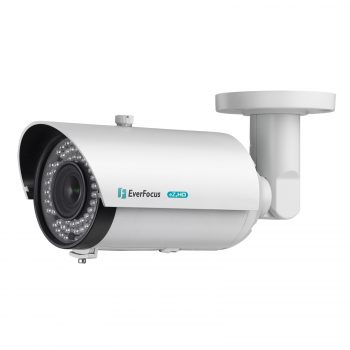We’ve detailed in a few posts how the presence of surveillance equipment can act as a deterrent. Our Steps to Defeat Smart Criminals even discussed how the presence of cameras alone can deter crime. The mere threat of getting caught through recorded video can convince criminals to go elsewhere. Taking this line of logic one step further, many customers inquire about purchasing fake security cameras. After all, if the mere threat of security footage deters crime, then fake cameras should still provide this threat. While we certainly do not sell fake security equipment, we are still happy to discuss this issue.
In this post, we address the topic of fake, or “dummy” cameras, from a few different perspectives. We begin with a look at how effectively these “cameras” turn away burglars. From there, we look at some of the most common ways to tell the difference between real and fake cameras. Additionally, many of our customers are not aware that installing dummy cameras can lead to legal issues. We cannot fully examine the subject of dummy cameras without addressing this danger. Finally, we look at some alternative solutions that provide more security than dummy cameras. Let’s dive into this topic by looking at whether or not fake security cameras lower the risk of crime.
So…Do Dummy Cameras Provide Security, or No?
Unfortunately, this question does not come with a simple answer. When looking at dummy cameras from a distance, they do often resemble their fully-functioning counterparts. Therefore, fake cameras could fool criminals who scout a property without getting very close. Fake security cameras may also fool the most naïve of burglars. While these “cameras” provide no match for professional criminals, younger, “part-time” thieves may steer clear. The mere sight of anything resembling a camera can keep the most uneducated away.
However, slightly more knowledgeable criminals can detect fake equipment when they see it. Criminals approaching a property and stumbling across dummy cameras will likely discover the ruse. Additionally, seeing fake equipment can lead smarter thieves to believe that they won’t run into any working cameras while onsite. Therefore, using dummy cameras can have the opposite effect of what the installer desires. Right around now, you should be asking, “How exactly do bad guys know a fake security camera when they see it?” We’re glad you asked. Let’s look at the telltale signs that can give dummy cameras away.

Knowing what types of clues to look for can help you easily determine whether a camera is real or fake.
How to Spot Dummy Cameras
Fake security cameras often have a few different features from their fully-operational counterparts. Even cameras that address one or two of these areas often fail in others. Knowing how fake cameras differ from their true security counterparts helps burglars know if cameras pose a real threat. Let’s look at some of the easiest, most obvious ways that dummy cameras miss the mark.
Installation Location and Appearance
In our post on Surveillance Camera Maintenance, we discussed the importance of choosing your cameras wisely. Outdoor cameras, for example, should have a specific rating for outdoor installation. Security companies can then install these cameras anywhere. This means that camera installation is based solely on a property’s specific vulnerabilities. Fake cameras, on the other hand, do not have a rating for outdoor installation. Therefore, you will often see these cameras mounted underneath awnings or in other sheltered locations. If you find outdoor cameras “hiding” from the conditions rather than out in the open, do not be surprised if these “cameras” are only for show.
Additionally, weatherproof cameras should look somewhat rugged. Dummy cameras provide a cheap alternative to the real thing. If installing fake security cameras required a significant investment, nobody would buy them. Instead, customers would simply opt for real cameras if they already needed to spend serious money. Therefore, dummy cameras often include cheap plastic covering, or a thin layer of glass over the lens. Security equipment manufacturers make cameras with a thick outer shell, often made of aluminum. Additionally, dome cameras generally have a thick, vandal-proof shell made of poly-carbonate plastic. Outdoor-rated cameras will certainly not look cheap or be easy to damage or destroy. If you find outdoor cameras that do meet this description, you’ve likely found a fake.

Most cameras, such as the dome camera by Everfocus, include easy-to-find branding. Cameras that do not include any branding are usually only installed for show.
The Devil is in the Details
Most security camera companies advertise their names on their products. Of course, most manufacturers of any products do this. You can look at almost any car and figure out who made it fairly quickly. Similarly, true security cameras generally have a visible brand name and/or product identification numbers on them. The Everfocus camera pictured provides a good example of this. If you come across a cameras that has absolutely no identifying part numbers or manufacturer information, you may have just found a dummy camera.
On the flipside, some fake cameras do have a brand name on them. If you see a camera with an unfamiliar brand name on it, do some quick smartphone research. Security camera companies do not also dabble in creating fake cameras. Therefore, if you come across any dummy security cameras during your search, you can rest assured that this manufacturer does not also make real security devices. Of course, this creates a bit of a “no-win” situation for fake camera companies. Creating non-branded products immediately raises suspicions. Unfortunately, putting brand names on dummy cameras makes it easy for criminals to confirm their non-recording status. Either way, burglars can use this detail (or lack of details, as the case may be) to help determine a camera’s legitimacy.
Cameras that Try too Hard
Security companies do not put extra features into their cameras to make them appear operational. A properly functioning camera often captures its footage with little to no fanfare. Potential criminals still see them because, as we pointed out earlier, they are usually installed in the very areas of a home or business most likely to be approached by criminals. Fake security cameras, on the other hand, may need extra features for criminals to notice them. For example, a blinking red light on a camera almost always screams “FAKE!” While decades-old camcorders may have a light that blinks while recording, modern security cameras do not.
Likewise, infrared (or “IR”) lights that glow unnaturally should come under the same suspicion. Infrared lights help cameras see at night, and provide a soft pink glow while operating. Very bright red lights generally point to fake IR lights, rather than the real deal. Furthermore, IR lights should only shine at night, when the camera needs the additional boost. If you see a camera with a ring of infrared lights on during the day, the camera poses no real threat to criminals. At this point, you should have no trouble spotting most fake security cameras. In addition to being easy to spot, fake cameras can occasionally get their owners in trouble. Let’s take a look at the potential legal downside to installing dummy cameras.
Possible Legal Issues with Fake Security Cameras
In addition to not providing the security that true cameras provide, installing fake security cameras comes with its own unique threat. Business owners or landlords installing fake cameras may face legal action in certain circumstances. Ken Kirschenbaum, one of the leading attorneys in the security industry, has addressed this topic. The website Security Info Watch captures this correspondence between Attorney Kirschenbaum and an industry professional regarding the potential installation of dummy cameras. The exchange raises a very interesting legal aspect to the topic of installing fake security cameras.
Attorney Kirchenbaum points out the dangers of making visitors feel safer than they should. He warns: “A false sense of security relied upon by another who has a right to rely on that security may very well expose a party responsible for security.” In other words, dummy cameras meant to fool thieves may also trick others into a false sense of security. If a thief robs a victim at a small store in front of a fake camera, for example, the victim will want to see the footage. Once the camera is exposed as fake, the victim may well take legal action against the store owner.

In addition to usually proving ineffective, installing fake security cameras can land their installers in legal trouble.
Attorney Kirschenbuam brings up landlords that install dummy cameras as well. If these devices fool tenants into a false sense of security, any landlord installing dummy cameras could land in legal trouble. At this point, we’ve looked at the limited effectiveness of fake security cameras. We’ve also looked at the differences between dummy cameras and real cameras, and the potential legal issues that fake security devices bring with them. Now, let’s look at some alternatives to dummy cameras that provide a much greater amount of security.
Alternatives That Offer Real Security
We hope this post has given you some insight into the topic of fake security cameras. Additionally, we would also like to point you towards information on true security alternatives. Of course, real security cameras provide the theft deterrence that people aim for when they install dummy cameras. They also provide true security by recording video footage that customers can use to keep an eye on their property and potentially solve any crimes or situations that arise. Most of these cameras even allow for remote viewing, allowing you to check in from any smartphone or computer. We have camera solutions for both commercial and residential customers.
We also recommend installing burglar alarm systems. These alarms provide useful security whether you have real cameras, dummy cameras, or no cameras at all installed. A monitored security system will create a siren response and send for police help upon detecting a property breach. We also install these systems in businesses as well as homes, just as we do with cameras. Security systems do a tremendous job stopping break-ins when they occur, and minimizing the damage from any potential burglary. If you have questions about any of our security products, place do not hesitate to contact us. We offer free site surveys to help design an effective security plan that works for you. Together, we can create a system of real security equipment to provide security and life safety for your property.
Feature Photo Credit: Johnny Web on Flickr. Used under CC BY-SA 2.0 License.
